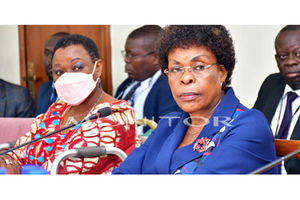
Attorney General Kiryowa Kiwanuka at Parliament recently.
Attorney General Kiryowa Kiwanuka finds himself ensnared in a quagmire of legal and ethical turmoil, following revelations of his controversial role in a Shs28.8 billion land compensation deal.
The case, which has ignited a firestorm of public scrutiny, centres on allegations of conflict of interest, breach of fiduciary duty, and contravention of anti-corruption laws—a scenario that has turned the tables against the nation’s chief legal guardian.
The controversy reached a boiling point after an intense X (formerly Twitter) exchange on July 18, where journalist and legal activist Agatha Atuhaire put Kiwanuka on the spot under the hashtag #AskTheAG. Ms Atuhaire’s pointed questions brought to light damning details: the land titles at the heart of the compensation were issued in 2014, well after the land had been classified as a wetland in 1995 and 1998.
The Lands ministry had, in a February 8, 2017, letter explicitly advised the Uganda Electricity Transmission Company Limited (UETCL) against compensating for the land, citing its illegal status. Yet, despite the red flags, the Attorney General (AG) gave the green light to a consent judgment authorising the payout.
Conflict of interest?
At the crux of the scandal is the AG’s decision to sign the consent judgment twice—once in his official capacity and again through his private law firm, K&K Advocates. This move has raised serious concerns about self-dealing and the egregious breach of conflict-of-interest principles.
Legal experts have not minced words, suggesting that Kiwanuka’s actions may violate Section 10 of the Anti-Corruption Act, which criminalises abuse of office. The Act stipulates that any public officer who acts arbitrarily or prejudicially against the interests of the government or another person, thereby abusing the authority of their office, commits an offence punishable by up to seven years in prison, a fine, or both.
Moreover, Kiwanuka’s role in the Shs28.8 billion deal could be construed as a violation of Section 19(1) of the Anti-Corruption Act, which prohibits actions or omissions that knowingly cause financial loss to the government or any public body. The penalties for such transgressions are severe, carrying a maximum sentence of 14 years imprisonment or a hefty fine.
Past scandals
The scandal casts a long shadow over Kiwanuka’s tenure as AG, bringing to mind the downfall of previous officeholders who found themselves on the wrong side of the law.
The legal community and the public alike are drawing parallels to the prosecution of former AG Joseph Ekemu, who in 2001 faced charges for misappropriating Shs30 million in interest from the Ministry of Justice.
Similarly, in 2009, then AG Kiddhu Makubuya was compelled to resign following his dubious involvement in a compensation case that saw businessman Hassan Basajjabalaba pocketing billions of shillings in market compensation.
Even further back, the spectre of the infamous junk helicopter acquisition saga, which led to the resignation of Solicitor General Lucien Tibaruka, looms large.
In Kiwanuka’s case, the stakes are particularly high. The Leadership Code, recently revised under his own stewardship, explicitly bars top government officials—including the AG—from engaging in certain business activities, especially those that could lead to conflicts of interest.
Article 113(4) of the Constitution outlines the ethical obligations of Cabinet ministers, emphasising the avoidance of conflicts that could compromise their duties. Yet, by involving his private law firm in the Shs28.8 billion deal, Kiwanuka appears to have flouted these very guidelines, effectively putting himself in a legal and ethical bind.
Legal tightrope
The consent judgment, which features signatures from a slew of representatives—including the Court Registrar Simon Kintu Zirintusa, K&K Advocates, the Attorney General’s office, UETCL, and Magna Advocates—has become a focal point of suspicion. The presence of multiple signatories, including unnamed company officials and holders of powers of attorney for some of the compensated parties, further complicates the narrative and raises questions about the transparency of the process.
With the heat turning up, Kiwanuka is now walking a legal tightrope. The public outcry and mounting legal scrutiny have placed him under intense pressure, with his every move being watched like a hawk.
As the scandal unfolds, the AG finds himself caught between a rock and a hard place, as the very laws he is sworn to uphold now seem to be closing in on him. Whether this case will spell the end of Kiwanuka’s career or lead to his day in court remains to be seen. But one thing is certain: the once-untouchable AG is now squarely in the crosshairs, and the consequences of his actions may very well come home to roost. Attempts by Sunday Monitor to reach out to the AG were futile as he neither took nor returned our calls.
Consent meeting
According to Isaac Ssemakadde, the executive director of Legal Brains Trust, a Kampala-based democracy and human rights watchdog, the mere holding of a consent meeting between the AG and his known private firm K&K Advocates is an indicator of a conflict of interest.
“The Attorney General’s coy description of his relationship with his former law firm, claiming to be ‘on sabbatical’ rather than having resigned, raises serious ethical concerns. By failing to explicitly resign from the firm as required by the Constitution, he creates a perception of impropriety and potential conflict of interest,” Ssemakadde, a dyed-in-the-wool anti-corruption activist, revealed, adding, “This lack of transparency undermines public trust in the office of the Attorney General and the rule of law. As our elders say, ‘a hen cannot dance on top of a basket without scattering the eggs.’ By trying to straddle both roles, the Attorney General risks scattering the very principles of justice he is sworn to uphold.”




